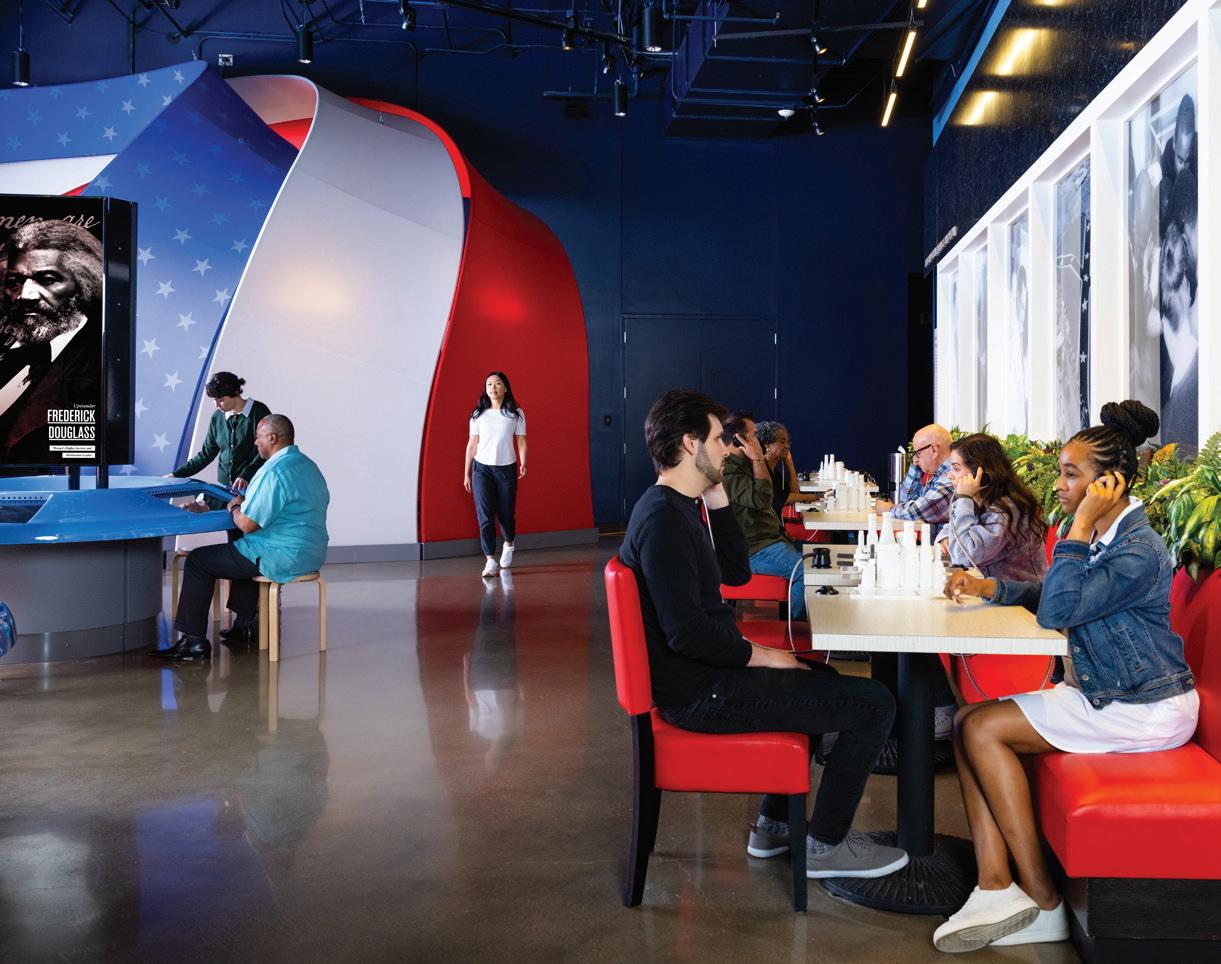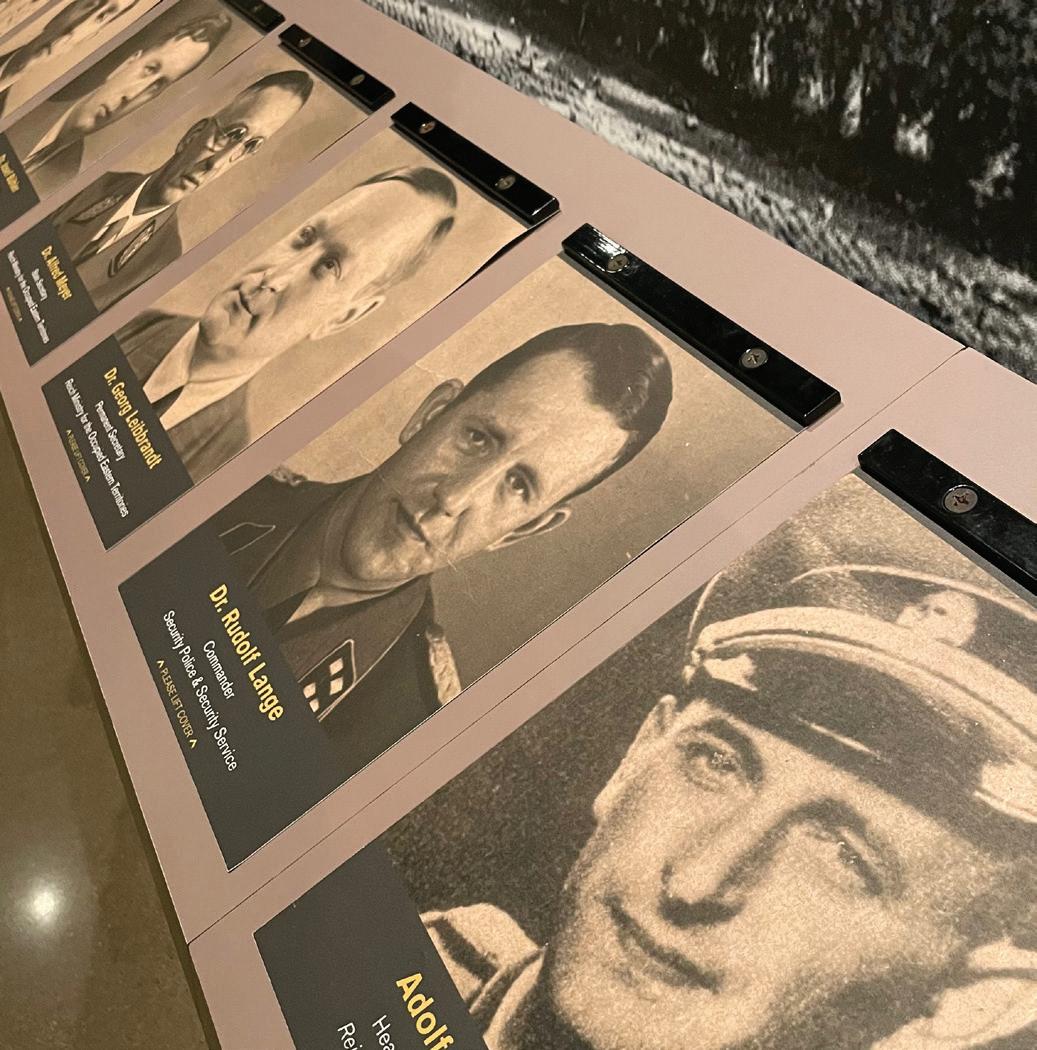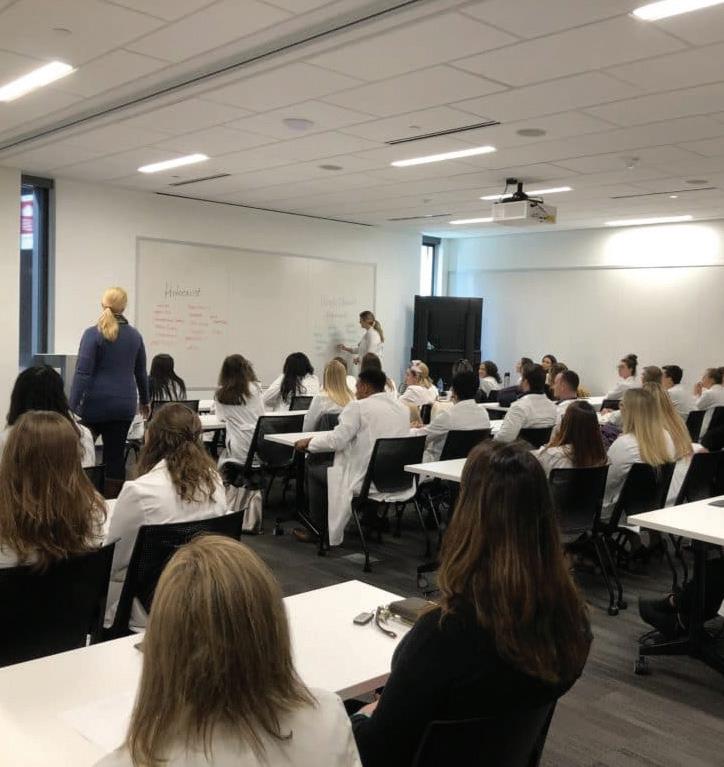PROFESSIONAL AND COMMUNITY PROGRAMS: Training and Learning Opportunities for Employees and Community Groups



At the Dallas Holocaust and Human Rights Museum, we are dedicated to our mission to teach the history of the Holocaust and advance human rights to combat prejudice, hatred, and indifference. Since our founding in 1984, we have held a deep-rooted responsibility to ensure that history lives on through education. We inform about the lessons of the Holocaust, the emergence of the Universal Declaration of Human Rights, historical genocides, and America’s journey for human and civil rights.
Connect with the Museum and our mission by engaging in our learning opportunities for professionals and community groups. We are pleased to offer an array of programs and resources that provide fact-based education about the ramifications of unchecked hatred and equips participants with the tools and means to combat it.
Through historical reflection, we encourage individuals to stand up for justice and challenge them to become a force for good in their communities. Together, we can inspire Upstanders!

Programs, Speakers, and Group Tours 2-3 Learning Series and Learning Hub ................................................................. 4-5 Upstander Training Program ............................................................................ 6-7 Law Enforcement, Health, and Legal Continuing Education 8-9
TABLE OF CONTENTS
PROFESSIONAL AND COMMUNITY PROGRAMS
Arrange an interactive learning opportunity that sparks conversations. Choose from one of the options below or let the Museum curate a program for a customized experience. The Museum has specialists who can present on historical themes such as:
Antisemitism and the Common Thread of Hate
Asian Americans’ Rights Children’s Rights
Genocide Studies/Awareness
Immigrant Rights
Hispanic Rights
Jewish American History
Slavery and Human Trafficking
African Americans’ Rights
Criminal Justice
American Indians’ Rights
Disability Rights
Holocaust History
LGBTQ+ Rights
Universal Human Rights
Human Rights History
Religious Rights
Women’s Rights
PROGRAMS, SPEAKERS, AND SPECIALTY TOURS
Understanding Unconscious Bias
Using visual thinking strategies to explore unconscious bias, participants are encouraged to discuss how unconscious bias impacts their professions and their roles in the community.
Equity and Equality
Using examples from legislative and judicial U.S. history, such as the 14th Amendment, participants explore the differences and challenges between the often-confused concepts of equality and equity.
What is an Upstander?
This program breaks down the stereotypical views of Upstander and bystander behaviors using historical examples. Participants are asked to reflect on their choices and encouraged to take steps toward Upstander behavior. Program can be curated based on heritage and awareness months and affinity groups.
History and Impact of Antisemitism
In a climate of rising antisemitism, this program offers the tools to help people better understand the complexity of antisemitism and its long historical development. The session concludes with today’s impact of antisemitism and strategies to stand up against it.
History 101 Talks
These lecture-based presentations provide context on historical topics connected to the Museum’s exhibitions, such as the themes listed above.
2
Holocaust History and Complicity
This historical analysis presentation uses images from Nazi Germany to inspire discussion on the role of professionals during the Holocaust. Participants will analyze the slippery slope of human behavior to reflect on their own professional choices and actions.
Uncovering Dallas Civil Rights
Learn about the history of civil rights in Dallas by viewing a historical film, hearing directly from local civil rights leaders, and discussing the importance of knowing local civil rights history.
Artifact Interaction
Interact with replica artifacts and photographs, learning about the Holocaust and human rights directly from primary source materials.
Preserving Family Memories
Learn how to care for family heirlooms, photographs, letters, and artifacts through this hands-on workshop that addresses the most common challenges of in-home preservation.
Survivor and Historical Speakers
Hear from survivors and historical speakers as they share their first-hand experiences. Speakers cover stories about the Holocaust, U.S civil rights, and other genocides.
Virtual Exhibition Tour
Be encouraged to think about the most fundamental questions of human nature through a virtual experience of our permanent exhibition. Tours are led online in real time by guides taking you through all three exhibition wings - Holocaust / Shoah, Human Rights, and Pivot to America, or a specialized themed tour.
Special Exhibition Program and Tour (*in-person only)
The Museum hosts different travelling exhibitions twice a year that expand upon lessons and stories from the permanent exhibition. Click HERE to view our current special exhibition.
“ The Museum offers powerful community and professional programming that brings the community together and provides a platform to learn more about our history, and how to act as upstanders. Their programming provides our employee and leaders an opportunity to hear from change makers, educators and influencers through public and private events with the Museum’s education staff.
Programs are available seven days a week and can be hosted at the Museum, onsite at your office, or virtually through Zoom.*
3 ”
- Texas Instruments
Looking for more than one engagement opportunity? The Museum offers tailor-made options that allow you to choose from quarterly, bi-monthly, or monthly content, asynchronous learning, and a robust training program that combines all.
LEARNING SERIES
Create a learning series that mixes and matches programs, speakers, and specialty tours. Content can be designed to support affinity groups, employee resource groups, diversity-inclusion councils, human resource staff, and more.
Sample Learning Series – Quarterly
Sample Learning Series – Bi-monthly
Holocaust Remembrance Week
History and Impact of Antisemitism
Hispanic Heritage Month
Sept.
What is an Upstander? Hispanic Rights Upstanders
Veterans Day
Virtual Exhibition Tour: Veteran and Wartime Upstanders
Women’s History Month
Understanding Unconscious Bias
AAPI Heritage Month - History 101: Development of Asian American and Pacific Islander Rights in U.S. History
Capstone Program
Equality and Equity
4 4
Q1 Q2
Q3 Q4
What is an Upstander?
Understanding Unconscious Bias
Survivor Speaker Presentation or Virtual Exhibition Tour Equality and Equity
Jan.
Mar.
May Nov.
Jul.
LEARNING HUB
Deepen your education through an online asynchronous learning program where participants explore activities and modules at their own pace. Receive 12-month access to the portal and digital library of resources from the Museum and other trusted sources. Learning is designed around these heritage and awareness months:
January February March
Holocaust Remembrance
Black History
April
Women’s History Genocide Awareness
May June July
Asian American and Pacific Islander Heritage
LGBTQ+ Pride Immigration and Refugee Awareness
September October
Hispanic Heritage
Disability Rights and Awareness
November
American Indian Heritage
August
Children’s Rights
December
Human Rights
Enhance your asynchronous learning through a customized portal that provides exclusive access to curated resources and allows you to track activity and engagement.

5
UPSTANDER TRAINING
Expand your learning even further through this year-long immersive training program that brings asynchronous learning and interactive programs together. Participants engage in historical and cultural discussions to better understand the past and its relevancy to current issues, and they explore how their choices and actions impact their professions and roles in the community. The Museum’s professional staff will work closely with you on developing a customized program designed to meet your needs.
The complete 12-month package offers:
• Virtual kick-off event for participants to learn about the program and scope.
• Online asynchronous learning platform designed around heritage and awareness months that also includes a digital library of resources from the Museum and other trusted sources.
• Facilitated quarterly or monthly programs hosted live online on select topics and recorded for on-demand access.
• Completion certificate provided at the end of the training program.
Participants will walk away with:
• Stronger critical thinking and self-reflection skills.
• Deeper understanding of historical and cultural concepts.
• Greater insight into the complexity of human behaviors.
• Ability to apply lessons from history to their personal and professional life.
• Tools to continue the learning journey beyond our training.
Up-stand-er (n)
• Stands up for other people and their rights.
• Combats injustice, inequality, or unfairness.
• Sees something wrong and works to make it right.
6






7
LAW ENFORCEMENT, HEALTH, AND LEGAL CONTINUING EDUCATION
The Museum is proud to offer continuing education programs for law enforcement and health and legal professionals. Through these programs, we aim to remind participants of the importance of their choices and responsibilities.
Law Enforcement Training Program
Enables law enforcement officers and recruits to think critically about their own professional and personal choices and ethics. Using the paradigm of the Holocaust as a starting point, participants are encouraged to examine their profession in a new light, exploring Holocaust and human rights history and reflecting on the implications of implicit bias today.
Health and Legal Professionals Program
Using the Holocaust as a historical framework, this program encourages participants to discuss the concept of personal and professional choice. The program explores the role and impact of their profession during the Holocaust and challenges health and legal professionals to reflect upon their professional, ethical, and personal responsibilities in our society.
The Dallas Holocaust and Human Rights Museum is a non-accredited CLE course sponsor. This course has been approved for Minimum Continuing Legal Education credit by the State Bar of Texas Committee on MCLE in the amount of 3 credit hours, of which 3 credit hours will apply to legal ethics/professional responsibility credit.
Programs include:
• Guided tour of the Museum’s permanent exhibition
• Exhibition debrief facilitated by Museum Educators
• Historical analysis activity
• Guided perspectives discussion
Program details:
• Duration: 3 – 5 Hours
• Law Enforcement Program: In person at the Museum
• Health and Legal Professionals Program: Virtual or in person at the Museum or your offices.
• Lunch available for an additional cost when hosted at the Museum.
8
“
I have attended many trainings at the Dallas Holocaust and Human Rights Museum and each time I come away with something new. It helps me remember why I chose my profession and about how individual decisions, which may seem inconsequential, can accumulate and alter my path and the path of those I encounter.




9 ”
- Corporal Knight, Arlington Police Department

DHHRM.ORG 214-741-7500 300 N. Houston Dallas, Texas 75202 education@dhhrm.org
















